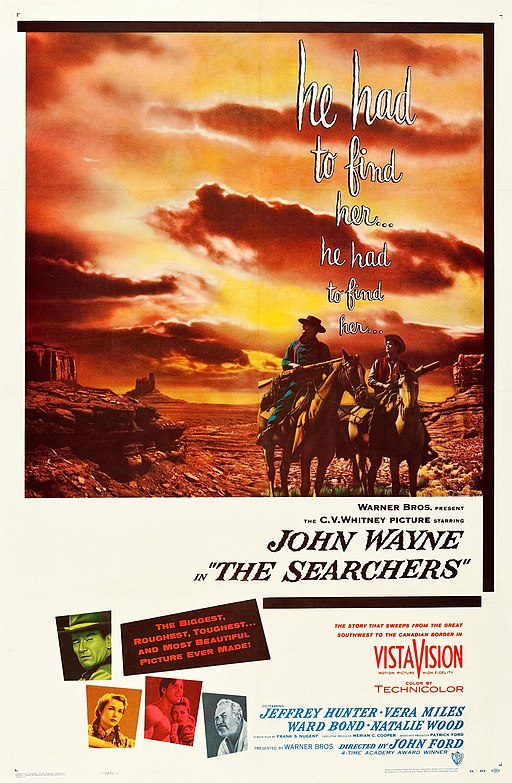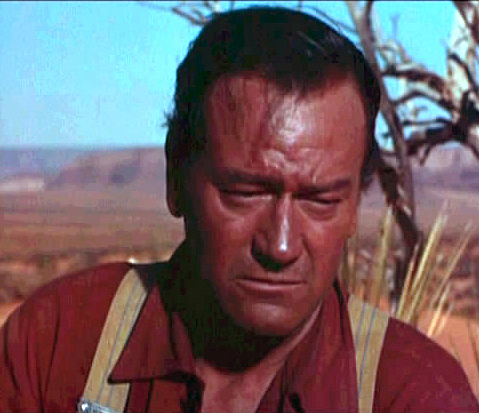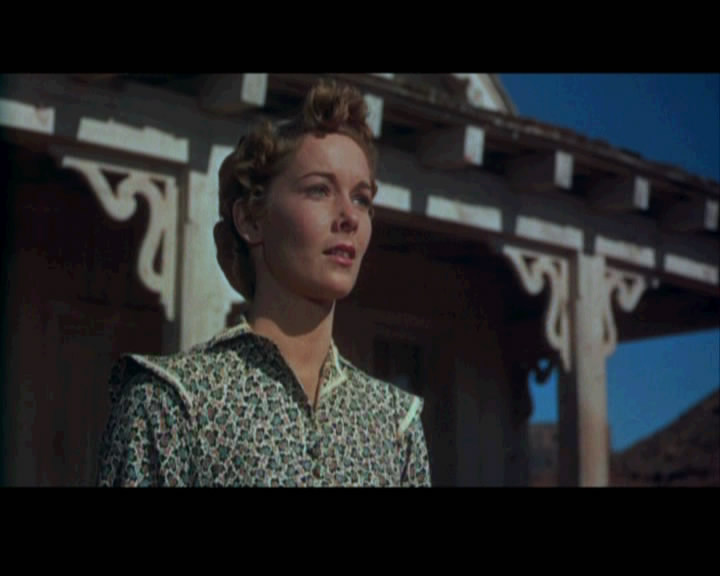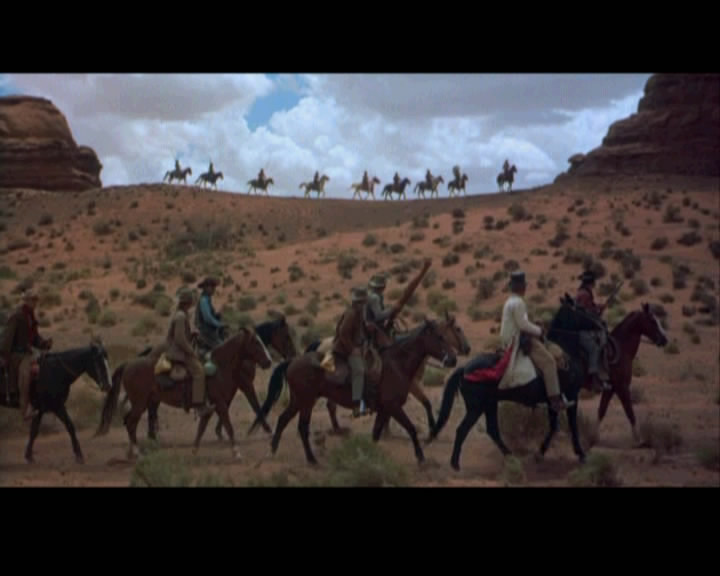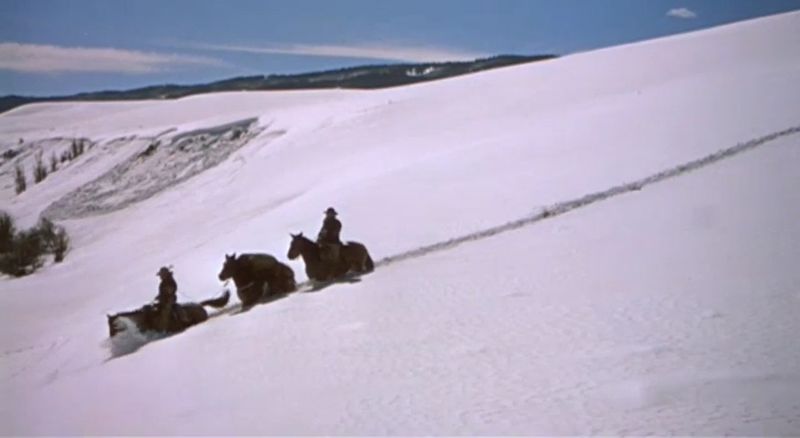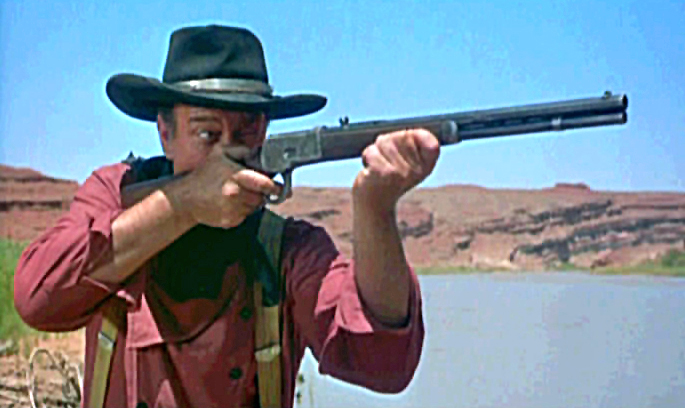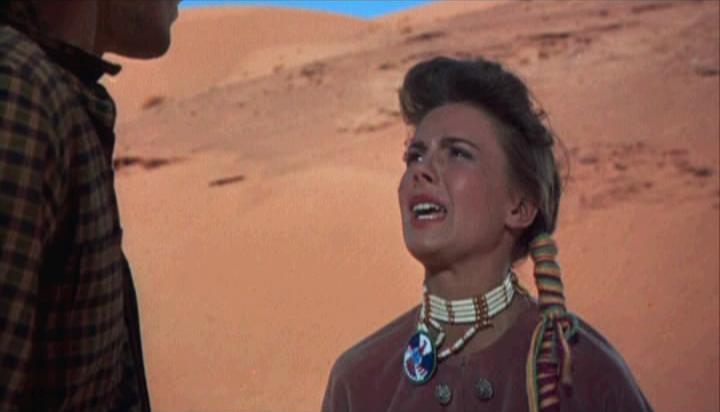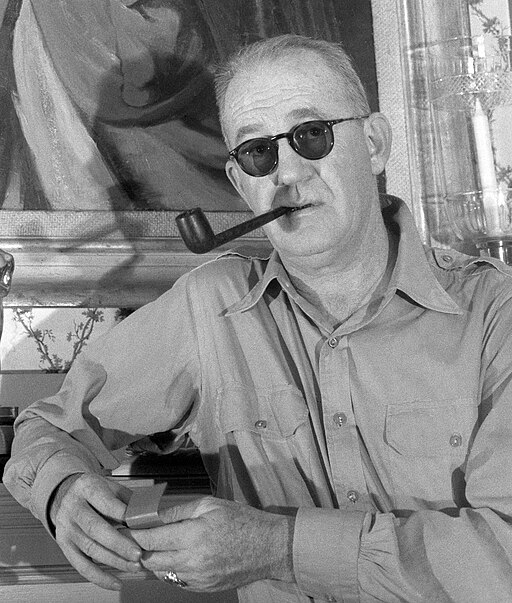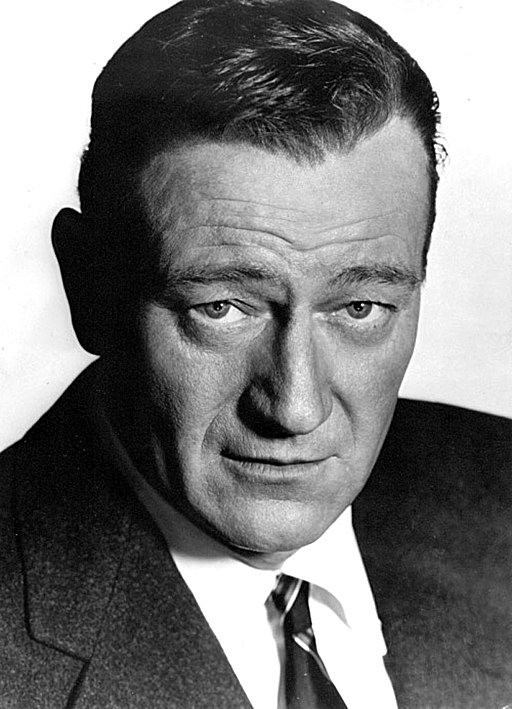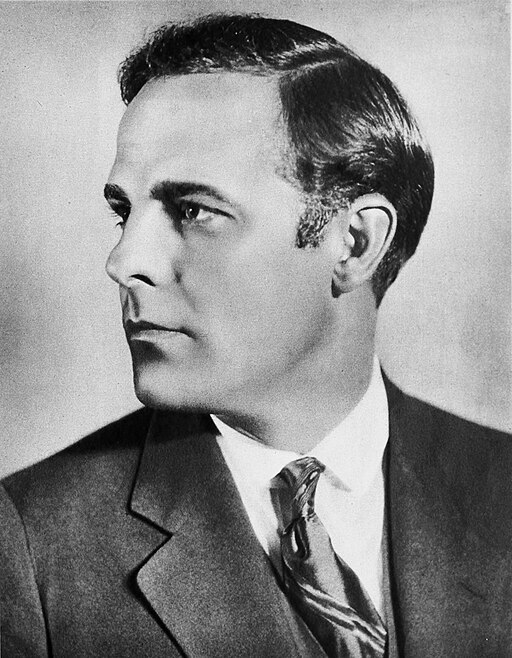The Searchers - 1956
back| Released by | Warner Bros. |
| Director | John Ford |
| Producer | C.V. Whitney |
| Script | Frank S. Nugent, based on the 1954 novel of the same name by Alan Le May |
| Cinematography | Winton C. Hoch |
| Music by | Max Steiner |
| Running time | 119 minutes |
| Film budget | $3.75 million |
| Box office sales | $4.8 million initial release |
| Main cast | John Wayne - Jeffrey Hunter - Vera Miles - Natalie Wood - Ward Bond |
The Searchers
A haunting tale of redemption in the American West
"The Searchers" (1956), directed by John Ford and starring John Wayne, is an iconic Western film renowned for its narrative depth and cinematic technique. Set in post-Civil War Texas, it tells the story of Ethan Edwards, a Civil War veteran on a relentless quest to rescue his niece, abducted by Comanche Indians.
Ford's masterful use of landscapes and framing, particularly the final shot of Ethan isolated in a doorway, has become emblematic of cinematic artistry. Despite minimal initial accolades, "The Searchers" profoundly impacted the genre, influencing countless filmmakers and evolving the Western narrative.
Related
The Searchers – 1956
"The Searchers," directed by John Ford and released in 1956, is not only a landmark Western film but also a profound exploration of complex themes such as obsession, racism, and redemption.
Setting: The film is set in Texas, post-Civil War, against the backdrop of the Texas–Indian wars.
Plot:
The story begins with Ethan Edwards (John Wayne), a Civil War veteran, returning to his brother's home three years after the war's end. His arrival is marked by mystery and a hint of a dark past.
Tragedy strikes when the family's home is raided by Comanche Indians, leading to the murder of Ethan's relatives and the abduction of his nieces, Debbie and Lucy.
Ethan, alongside part-Cherokee Martin Pawley (Jeffrey Hunter), embarks on a relentless, obsessive quest to find the abducted girls. Ethan's hatred for Native Americans is palpable and shapes his ruthless approach.
The search spans several years, during which Ethan's obsessive hatred and Martin's more humane approach to Native Americans clash. Ethan's racism is stark; he even considers killing Debbie when he learns she has been assimilated into the Comanche tribe.
The climax arrives when they finally find Debbie, now a young woman (played by Natalie Wood). Ethan's internal conflict reaches its peak, but in a moment of redemption, he decides to save her instead of enacting his earlier plan to kill her.
The film ends with the rescue of Debbie and the group's return home, but Ethan remains an outsider, unable to integrate into the society he has protected, symbolized by him standing alone in the doorway before turning away.
Themes:
- Obsession and Redemption: Ethan's obsessive quest is a journey through his own hatred and racism. His final act of saving Debbie, instead of harming her, indicates a complex process of redemption.
- Racism and Cultural Conflict: The film boldly addresses racism, especially Ethan's disdain for Native Americans. It portrays the harsh realities of cultural conflicts during that era.
- Outsider Status: Ethan is portrayed as an eternal outsider, reflecting post-war disillusionment and the personal cost of maintaining one's moral compass in a changing world.
Cinematography and Direction:
Ford's use of wide shots to capture the expansive landscape of the American West contributes significantly to the film's dramatic impact.
The iconic final shot of Ethan framed in a doorway encapsulates his alienation and the sacrifices he's made.
Legacy:
"The Searchers" has influenced many filmmakers and is often cited in discussions about the greatest films ever made.
Its complex portrayal of characters, especially the flawed protagonist, was ahead of its time and has contributed to its enduring legacy in cinema history.
Full Cast of “The Searchers”:
- John Wayne as Ethan Edwards
- Jeffrey Hunter as Martin Pawley
- Vera Miles as Laurie Jorgensen
- Ward Bond as Rev. Capt. Samuel Johnston Clayton
- Natalie Wood as Debbie Edwards (older)
- John Qualen as Lars Jorgensen
- Olive Carey as Mrs. Jorgensen
- Henry Brandon as Chief Cicatrice (Scar)
- Ken Curtis as Charlie McCorry
- Harry Carey Jr. as Brad Jorgensen
- Antonio Moreno as Emilio Figueroa
- Hank Worden as Mose Harper
- Beulah Archuletta as Wild Goose Flying in the Night Sky (Look)
- Walter Coy as Aaron Edwards
- Dorothy Jordan as Martha Edwards
- Pippa Scott as Lucy Edwards
- Patrick Wayne as Lt. Greenhill
- Lana Wood as Debbie Edwards (younger)
- Robert Lyden as Ben Edwards
Official Trailer of "The Searchers":
Analysis of the Direction of John Ford:
ohn Ford's direction of "The Searchers" (1956) is widely regarded as a masterclass in cinematic storytelling, particularly within the Western genre. Ford's directorial approach in this film is multifaceted, combining a profound understanding of narrative, character development, and visual composition.
- Cinematic Landscapes: Ford's use of the American West, particularly Monument Valley, is iconic. The vast, rugged landscapes are more than just backdrops; they are integral to the story, reflecting the characters' emotional states and the film's themes. Ford's framing often places characters against these vast expanses, emphasizing their isolation and struggle.
- Symbolic Use of Doorways: One of the most striking visual motifs in "The Searchers" is the use of doorways and windows, framing characters in transition or as outsiders. The opening and closing shots, with Ethan Edwards framed in a doorway, are among the most famous in cinema, symbolizing his perpetual status as an outsider.
- Complex Protagonist: Ford's portrayal of Ethan Edwards, played by John Wayne, is notable for its complexity. Ethan is not a typical heroic figure; he is deeply flawed, racist, and obsessed. Ford doesn't shy away from these darker aspects, using them to explore themes of obsession, racism, and the personal costs of vengeance.
- Moral Ambiguity: The direction challenges the black-and-white morality often seen in earlier Westerns. Ford presents a world where good and evil are not clear-cut, reflected in the characters' moral ambiguity and difficult choices.
- Epic Scope and Intimacy: Ford balances the epic scope of the story – a years-long quest across the American frontier – with intimate moments of character development and interaction. This duality adds depth to the narrative, making it both a grand adventure and a personal drama.
- Pacing and Tension: Ford's pacing is deliberate, allowing the tension and emotional stakes to build over time. He intersperses moments of high drama with quieter, character-driven scenes, creating a rhythm that keeps the audience engaged.
- Innovative Storytelling: Ford's direction in "The Searchers" influenced not just the Western genre but also the broader landscape of filmmaking. His use of landscape, framing, and complex character portrayal has been studied and emulated by many directors.
- Cultural Critique: Ford doesn’t just celebrate the myth of the American West; he also critiques it. By dealing with issues like racism and the treatment of Native Americans, Ford adds a layer of social commentary to the film.
Analysis of the Performance of John Wayne:
John Wayne's portrayal of Ethan Edwards in "The Searchers" stands as one of his most significant and complex performances. His character, Ethan, is a multifaceted figure whose depth challenges the typical Western hero archetype.
- Haunted Past: Ethan is introduced as a character with a mysterious and possibly dark past. His experiences in the Civil War and evident racial prejudices paint a picture of a man shaped and hardened by violence and loss.
- Obsession and Hatred: Ethan's obsessive quest to find his abducted niece, Debbie, is driven by a deep-seated hatred for Native Americans. This obsession is a defining characteristic of his personality, showcasing a man consumed by vengeance and racial animosity.
- Subtle Emotional Depth: Wayne's performance is nuanced, capturing the internal conflicts of a man torn between his hatred and his duty to his family. He portrays Ethan's rugged exterior while allowing glimpses of vulnerability, particularly in moments when he's reminded of his family.
- Physicality and Presence: Wayne uses his formidable physical presence to convey Ethan's dominance and resilience. His body language and demeanor reflect the character's unwavering determination and often unspoken inner turmoil.
- Anti-Heroic Nature: Unlike the archetypal Western hero, Ethan is morally ambiguous. His actions and attitudes often blur the line between heroism and villainy, creating a character that is both fascinating and unsettling.
- Racism and Redemption: The role of Ethan is critical in exploring themes of racism and redemption. Wayne skillfully portrays Ethan's gradual, albeit incomplete, transformation, especially in the film's climax where he chooses to save Debbie rather than harm her due to her assimilation into Comanche culture.
- Contrast with Other Characters: Ethan's interactions with other characters, particularly Martin Pawley, highlight his complexities. His often contentious relationship with Martin, who is part-Cherokee, serves to underscore Ethan's prejudices and the challenges in overcoming them.
- Emotional Isolation: Wayne's portrayal emphasizes Ethan's emotional isolation. Despite his heroic actions, he remains an outsider, unable to fully reconcile with society or his inner demons.
- Defining Performance: This role is considered one of John Wayne's finest, showcasing his ability to take on more complex and demanding roles than the straightforward heroes he often portrayed.
- Impact on Western Genre: Wayne's performance as Ethan Edwards had a lasting impact on the Western genre, introducing a more nuanced and flawed type of protagonist that would influence future films and characters.
Where was “The Searchers” filmed?
"The Searchers" was primarily filmed in Monument Valley, located on the Arizona-Utah border. This area is renowned for its striking and iconic sandstone buttes, which have become synonymous with the American West in cinema. The vast, rugged landscapes of Monument Valley provided a perfect backdrop for the film's epic narrative and visually stunning scenes.
Additionally, some scenes were filmed in other locations to capture the diverse landscapes needed for the story. These locations included parts of California, such as Bronson Canyon and the Warner Bros. Burbank Studios in Los Angeles, as well as Mexican Hat, a small town near Monument Valley in Utah.
Director John Ford was known for his preference for filming in Monument Valley, using its dramatic scenery to great effect in many of his Westerns. The location's distinctive landscape has since become closely associated with Ford's work and the Western genre in general.
Memorable Quotes:
Ethan Edwards (John Wayne): "That'll be the day."
This line became one of the film's most famous, often associated with Wayne's character. It's a recurring line used by Ethan throughout the film, reflecting his cynical and defiant attitude.
Ethan Edwards: "We'll find 'em just as sure as the turnin' of the earth."
This quote encapsulates Ethan's relentless determination in his quest to find his niece, showcasing his unwavering resolve.
Martin Pawley (Jeffrey Hunter): "I hope you die!"
Said to Ethan in a moment of anger, this line reflects the tension and moral conflict between Martin and Ethan, highlighting the complexity of their relationship.
Ethan Edwards: "Let's go home, Debbie."
This line is significant as it marks Ethan's moment of redemption and change of heart towards his niece, Debbie, at the film's climax.
Laurie Jorgensen (Vera Miles): "It just so happens we be Texicans."
Laurie's line is a proud declaration of identity, reflecting the strong sense of regional pride and identity prevalent in the characters and setting of the film.
Ethan Edwards: "Injun will chase a thing till he thinks he's chased it enough. Then he quits. Same way when he runs. Seems like he never learns there's such a thing as a critter will just keep comin' on. So we'll find 'em in the end, I promise you. We'll find 'em just as sure as the turnin' of the earth."
This quote reveals Ethan's understanding of persistence and his insight into the mindset he believes his adversaries have, demonstrating his strategic thinking.
Rev. Capt. Samuel Johnston Clayton (Ward Bond): "Well, the prodigal brother. When'd you get back, Ethan?"
This line is part of the film's opening, establishing the relationship between Ethan and the community, as well as hinting at Ethan's mysterious past.
Analysis of Natalie Wood's Performance:
- Maturity and Depth: Despite limited screen time, Wood brought a depth and maturity to the character of Debbie. She convincingly portrayed a young woman torn between two worlds - the one she was born into and the one she was forced into.
- Complex Character Portrayal: Wood's portrayal of Debbie showcased her ability to convey complex emotions. Debbie is a character who has endured trauma and adaptation to a completely different culture, and Wood captured this nuanced psychological transformation effectively.
- Symbolic Presence: In the film, Debbie's character is more than just a rescue objective; she symbolizes the broader themes of cultural identity and integration. Wood's performance added to this symbolic weight, particularly in her interactions with John Wayne's character, where she embodies the conflict between the settlers and Native American cultures.
- On-Screen Presence: Wood's on-screen presence held its own alongside seasoned actors like John Wayne and Jeffrey Hunter. Her portrayal contributed significantly to the film's emotional impact, particularly in the reunion scene with Ethan, which is pivotal to the film's resolution.
Awards and Recognition:
Awards and Nominations:
1957 Brussels World Film Festival:
- Winner: Golden Leopard (John Ford)
1957 Directors Guild of America:
- Nominated: Outstanding Directorial Achievement in Motion Pictures (John Ford)
Despite its limited recognition in terms of awards at the time, "The Searchers" has gained immense critical acclaim and scholarly attention in the years since its release. It is often cited for its influence on the Western genre and filmmaking in general. The film's reputation has grown considerably, and it is now frequently listed among the greatest films of all time in various critics' polls and cinematic studies.
Legacy and Recognition:
- The American Film Institute (AFI) has consistently ranked "The Searchers" highly in its various lists. It appeared on AFI's original "100 Years...100 Movies" list in 1998 and was ranked 12th on the 10th Anniversary Edition of that list in 2007.
- The film has been preserved in the United States National Film Registry by the Library of Congress as being "culturally, historically, or aesthetically significant."

